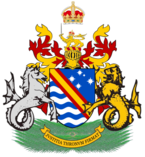Parliament of Ibagli
 This article is a part of the Politics and Government of Ibagli series. |
| Executive |
|---|
|
Monarch (King Charles III) |
| Legislative (Parliament) |
|
House of Commons (Speaker) |
| Judicial |
|
Supreme Court (Chief Justice) |
The Parliament of Ibagli is the legislative branch of the Ibaglian government. According to section 7 of The Constitution Act, 1955, Parliament consists of the Sovereign, the Senate, and the House of Commons.
Senators are appointed by the Governor-General on the advice of the Prime Minister. There may be no more than seventy Senators at any time. Members of the House of Commons are elected by the people of Ibagli. Of the 60 members of the House, 30 are directly elected by the people using the first-past-the-post method, and 30 are elected by proportional representation.
The House of Commons is the dominant chamber of Parliament. The Senate rarely refuses to approve bills passed by the lower house. There have been several recent moves to abolish the Senate.
History
The first legislative body in Ibagli was the Executive Council, which was established in 1903. In 1910, the Legislative Council and the Legislative Assembly were created. Most of the functions of the Executive Council were transferred to the Legislative Council, which consisted of four ex officio members and three representatives of the community. The Legislative Assembly consisted of seven members elected by males who were British subjects. The Legislative Assembly was expanded to 15 in 1922, and the first political party in Ibagli - the Reform Party - was founded. It won a majority of seats in the Assembly, and its leader, William Patterson, was appointed Colonial Secretary. Successive colonial secretaries were chosen in a similar manner after successive elections, and the office became colloquially referred to as Premier. This term became official in 1944.